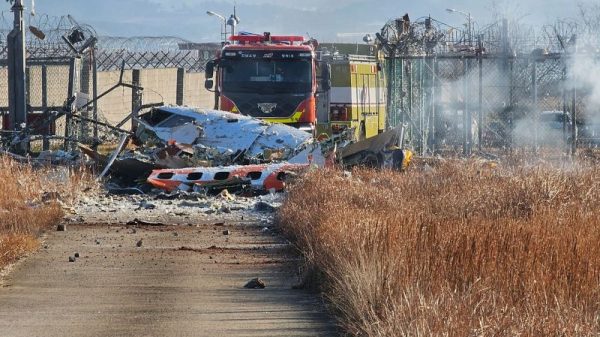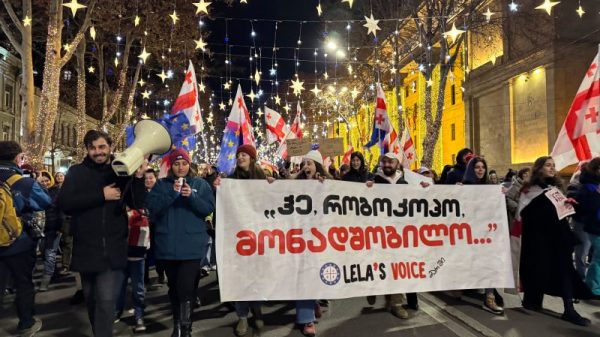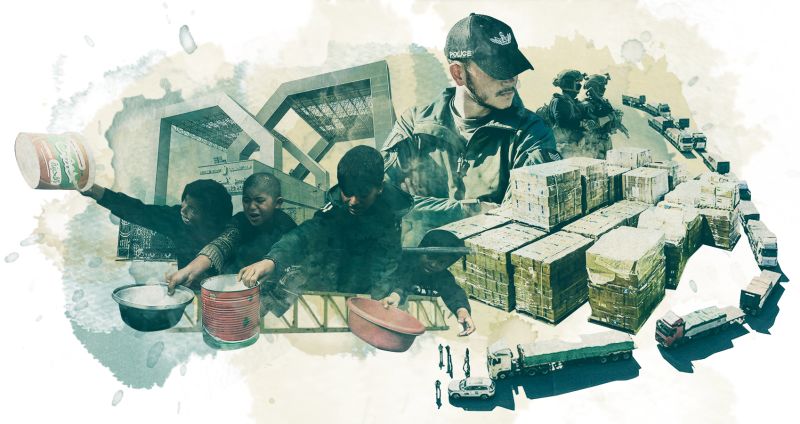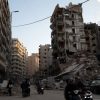Humanitarian workers and government officials working to deliver urgently needed aid for Gaza say a clear pattern has emerged of Israeli obstruction, as disease and near-famine grip parts of the besieged enclave.
Other items that have ended up in bureaucratic limbo include dates, sleeping bags, medicines to treat cancer, water purification tablets and maternity kits.
Israel’s throttling of aid came into sharper focus Thursday when its military opened fire as desperate Palestinians gathered around food aid trucks in western Gaza City, according to eyewitnesses. This triggered panic and some people were shot while others were plowed by trucks whose drivers tried to flee, eyewitnesses say. At least 112 Palestinians were killed and hundreds more were injured, according to health officials. The IDF said it had fired warning shots to disperse a crowd after seeing that people were being trampled.
A White House readout of a phone call between US President Joe Biden and Qatari Emir Tamim al-Thani on Thursday said both leaders agreed the horrific event underscored “the urgency of bringing negotiations to a close as soon as possible and expanding the flow of humanitarian assistance into Gaza.”
US Senator Chris Murphy said the situation was “a result of the complete breakdown in social order in Gaza, which is spiraling out of control without a massive influx of humanitarian aid and a pause in the fighting.”
For months, queues of trucks bound for the enclave have been backed up along the highway leading from the Egyptian town of Arish, a major logistical hub for aid, to the Rafah crossing with Gaza. In a satellite image from February 21, a queue of trucks can be seen stretching out for 4 miles from the crossing.
Across the border, Israel’s bombardment edges closer to some two million people hemmed in between the southern Gazan city of Rafah and Egypt’s frontier. Further north, at least six children have died in hospitals in recent days from dehydration and malnutrition, according to Gaza’s health ministry.
It’s deliberately opaque, deliberately ambiguous
Senior humanitarian official
“While there’s a war being fought in Gaza, we are fighting a different war here,” said one humanitarian worker at Egypt’s Rafah crossing with Gaza. “It is a war to bring humanitarian aid to Gaza.”
Several sources said a substantial portion of the donations they handled were either rejected or held up by a long wait for clearance by Israel’s Coordinator of Government Activities in the Territories, or COGAT, which manages the flow of aid into the strip.
“It’s deliberately opaque, deliberately ambiguous,” said another senior humanitarian official. “You can receive clearance from COGAT and arrive to find police or finance and customs officials who will send the truck back.”
“Israel assists, encourages and facilitates the entry of humanitarian aid for the residents of the Gaza Strip and for medical and other critical infrastructures in the strip,” the statement said. “Israel’s war is against the Hamas terrorist organization, not against the residents of the Gaza Strip.
Israel has long barred certain items from entering Gaza. In 2007, it imposed a blockade on the strip after Hamas took over. A year later, COGAT released a list of banned “dual use” items, making slight modifications to the document in the years that followed.
These are goods which, it said, could be repurposed for military use and would be barred from entering Gaza, such as concrete, agricultural fertilizer, certain chemicals and other miscellaneous items like binoculars, underwater cameras and water skis.
But those criteria appear to have been abandoned in the aftermath of Hamas’ brutal October 7 attack on Israel, which left about 1,200 people dead and over 250 people held hostage, according to Israeli authorities.
We provide minimal humanitarian aid… If we want to achieve our war goals, we give the minimal aid
Israeli Prime Minister Benjamin Netanyahu
The Israeli military responded with an intensive air, sea and land assault on Gaza that has sent the death toll soaring to over 30,000 people, according to Gaza’s health ministry, devastating most of the strip’s buildings and houses, as well as large swathes of its commercial sector and farmlands.
In a January 13 press conference, Israeli Prime Minister Benjamin Netanyahu boasted about permitting “minimal humanitarian aid” to enter Gaza.
“We provide minimal humanitarian aid,” Netanyahu said. “If we want to achieve our war goals, we give the minimal aid.”
The international community has repeatedly criticized Israel for issuing insufficient permits, and security clearances, for aid trucks to Gaza. There have also been instances where the Israeli military struck food deliveries. Looting by desperate civilians and criminal gangs in some of the hardest hit areas in the north of Gaza has intensified that crisis, bringing UN food deliveries there to a grinding halt.
Exacerbating the situation is an apparent ghost list impeding the delivery of a wide range of items.
“I’ve never seen a supply chain that ought to be so simple be so complicated,” said Save the Children US president and chief executive Janti Soeripto. “The level of barriers being put in place to hamper humanitarian assistance; we’ve never seen anything like it.”
She said toys were rejected because they were in a wooden box rather than a cardboard box, sleeping bags were denied because they had zippers, and sanitary pads were turned back because a nail clipper was included in the hygiene kit.
In January, US Senators Chris Van Hollen and Jeff Merkley saw maternity kits and water filtration systems among the items Israel turned back from its inspection point in Nitzana.
“We learned that when a truck with just one of those items is turned down, the entire truck gets turned around and has to go back to the beginning of the process, which can take weeks,” Van Hollen said.
“We talked to the heads of international aid organizations that had been working in conflicts worldwide for decades,” the senator added. “They said they’d never seen a more broken system.”
The situation prompted Van Hollen to spearhead US congressional efforts to hold Israel accountable for its handling of humanitarian aid, which he described on the Senate floor earlier this month as a “textbook war crime.”
Israel’s elusive guidelines on restricted items
Publicly, COGAT claims that it has abided by its 2008 banned items list. In private, COGAT has said that that document is now obsolete, according to a humanitarian official in direct contact with the Israeli unit.
COGAT enforced the 2008 list when the war first erupted on October 7, the official said. “About three weeks in, they said that list is not valid for this response. This is a different context. They said ignore the list.”
“No one can argue that sleeping bags are going to win a war,” the official said. “We did push back on that and warned them that it would look pretty silly if this got out.”
Four sources described another incident when Israel rejected a shipment of dates – a rich source of nutrients desperately needed by a hungry population. Two of the sources said it was because the seeds were picked up as a suspicious object in the x-ray inspection imaging.
Other trucks carrying dates have been allowed into Gaza, according to UN data. But humanitarian workers have said they are worried about a repeat, and several have resorted to pitting dates prior to inspection.
COGAT provides a range of reasons for these denials. Sometimes it cites bureaucratic issues, such as an incorrect manifest, other times the items are in whole or in part deemed to be dual use, sources said. Some of the reasons provided to humanitarian organizations appeared to be expressly political. Most of the time, COGAT doesn’t provide a reason for the rejections at all.
The confusion prompted Israeli rights group GISHA to file a Freedom of Information Act request on February 7 asking the Israeli government to release details of any new restrictions on aid imposed since October 7.
“The Israeli public has a right to know what is being done in its name in Gaza.”
Anesthetics, crutches and other ‘frequently rejected items’
For doctors and patients inside Gaza, the implications are excruciating. There are numerous reports of preventable deaths for lack of oxygen and ventilators. Over 1,000 children have undergone leg amputations in Gaza, according to UNICEF, some without anesthesia. That figure was compiled by UNICEF at the end of November and has not been updated since.
There was no anesthesia. My anesthesia was the Quran which I was reciting
Ahed Bseiso, 17, recalling her leg amputation
“He brought the kitchen knife and cut my leg off with it. And in that moment, I said praise be to God. Because he brought me patience.”
Medicines in Gaza began to run out shortly after the war erupted on October 7. Injuries from intensive bombardment skyrocketed while Israel stifled aid deliveries.
“Towards the end of my 43 days in Gaza, we had run out of anesthetic, and we were doing procedures with no anesthetic at all,” said British-Palestinian surgeon Dr. Ghassan Abu-Sittah from his clinic in London, two months after his return from Gaza.
“We were having to do extremely painful cleaning procedures to stop wound infections on children with no anesthetic and no analgesic.”
In the absence of appropriate medical supplies, Abu-Sittah concocted a solution to fight infection: dish soap mixed with vinegar and saline.
“I would pour that over the wound and scrub the wound down,” Abu-Sittah said. “It was probably the darkest moment of my life. The child was screaming. The parent was crying, and you’re trying to just block all of this out and do it as quickly as possible.
“But knowing that if you hadn’t, that child would be dead by the end of the day.”
Another humanitarian source inside Gaza said that in early February he witnessed a six-year-old child with burns covering 40% of her body. She was at a hospital in Rafah, the best supplied population center in Gaza, where medics could only give her aspirin to ease her agony.
Another woman, Um Adel, said her granddaughter died due to a lack of oxygen at a hospital in the southern Gazan city of Khan Younis.
Israel’s restrictions have also impacted medicines for the chronically ill. For weeks, COGAT temporarily prevented insulin pens for children with diabetes from entering Gaza, according to the UN Humanitarian Coordinator for Palestine Jamie McGoldrick and one other source.
“On the goods that are being prohibited, it’s a full range,” said McGoldrick in a January 24 press conference. “Some of it is medical material such as basic drugs and material for treating not just trauma but for chronic illnesses.
“One example would be most recently the pens that are used for insulin for children,” he added. “In terms of the rationale for it, I really can’t explain it because I don’t know.
“These are essential commodities for us to address the emergency which is currently unfolding in a very dramatic fashion.”
At one of the waypoints of aid in Jordan, stacked boxes of donations extend for around eight miles, a backlog that would require around a thousand trucks to deliver, Jordan’s charity officials estimate.
The director of programs and planning for the Jordanian Hashemite Charity Organization (JHCO), Marwan al-Hennawy, slits open a box of food to show what should be reaching people in Gaza; this one contains rice, chicken stock, tuna and dates. It is enough to feed a family of five for two weeks.
Al-Hennawy scans the sea of boxes around him. “It’s painful to look around and see all this,” he says. “I feel like I’m trapped. I know Gazans desperately need this help but I can’t get it to them. It’s like a nightmare.”







































